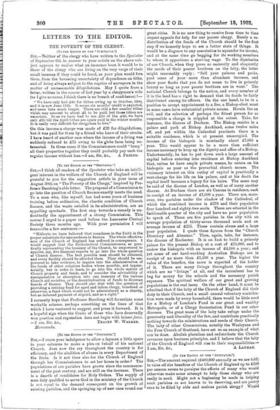[To TER EDITOR OF THE "SPECTATOR.1
crave your indulgence to allow a layman a little space in your columns to make a plea on behalf of his national Church. Just now the cry throughout the country is for efficiency, and the abolition of abuses in every Department of the State. Is it not time also for the Church of England through her Commissioners to set her house in order ? The populations of our parishes have grown since the commence- ment of the past century, and are still on the increase. There is a dearth of candidates for Holy Orders. The supply of men duly qualified to serve God in the ministry of the Church is not equal to the demand consequent on the growth of existing parishes, and the springing up of new ones round our
great cities. It is no new thing to receive from time to time urgent appeals for help for our poorer clergy. Surely a• re- distribution of the funds of the Church should be the first step if we honestly hope to see a better state of things. It would be a disgrace to any association to squander its income, and at the same time go begging for its working members to whom it apportions a starving wage. To the dignitaries of our Church, when they press so earnestly and eloquently the needs of their poorer brethren on the laity, the latter might reasonably reply : "Sell your palaces and parks, pool some of your • more than abundant incomes, and show your flocks that you do not mean to live in princely luxury so long as your poorer brethren are in want." The national Church belongs to the nation, and every member of it in the land has a right to demand that its funds be fairly distributed among its officers. On the one hand, to be in a position to accept appointment to a See, a Bishop-elect must in some cases have substantial private means. Herein lies an evil, and the selection of perhaps the fittest person for so responsible a charge is crippled at the outset. Take, for instance, the diocese of Durham. The Bishop resides in a palace and park at Bishop Auckland, some twelve miles off, and yet within the Cathedral precincts there is a suitable residence, which is at present unoccupied. The income of the bishopric is nominally about 27,000 a year. This would appear to be a more than sufficient income necessary to keep up the dignity and office of a Bishop. Unfortunat‘ly, he has to put down such a large amount of capital before entering into residence at Bishop Auckland that, unless he have ample private means, he enters on his bishopric as poor as the proverbial church mouse. The visionary interest on this outlay of capital is practically a rent-charge for his life on his palace, and at his death the capital itself becomes a legacy for his heirs. The same may be said of the diocese of London, as well as of many another diocese. At Durham there are six Canons in residence, each in receipt of an income of 21,000 a year. There are, more- over, two parishes under the shadow of the Cathedral, of which the combined income is 2378 and their population four hundred and eighty-two souls. These are situated in the fashionable quarter of the city and have no poor population to speak of. There are five parishes in the city with an average population of thirty-seven thousand souls and an average income of 2255. These contain slums and a large poor population. I quote these figures from the "Church Directory and Almanac." Then, again, take, for instance, the diocese of Rochester. It is on foot to build a princely palace for the present Bishop at a cost of 215,000, and to endow the bishopric with an income of 24,500 a year ; and yet some of our bard-working Australian Bishops are in receipt of no more than 21,500 a year. The higher the value of the benefice, the more is expected of the bolder of it. There are many livings throughout the country which are no " livings " at all, and the incumbent has to beg for money for the schools and the necessary parish expenses. The spiritual welfare of our great and growing populations is the real issue. On the other hand, it must be admitted that if the laity of the Church of England did their duty to their Church, and a small annual voluntary contribu- tion were made by every household, there would be little need for a Bishop of London's Fund in our great and wealthy Metropolis, or of a Clergy Sustentation Fund in our other dioceses. The great mass of the laity take refuge under the generosity and liberality of the few, and contribute practically nothing towards the ministrations and needs of their Church. The laity of other Communions, notably the Wesleyans and the Free Church of Scotland, have set us an example of what can be done. Abolish pluralism and redistribute the Church revenues upon business principles, and I believe that the laity of the Church of England will rise to their responsibilities.—






































 Previous page
Previous page